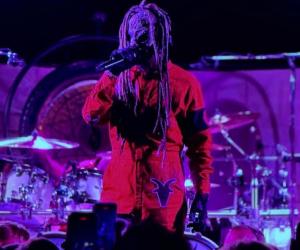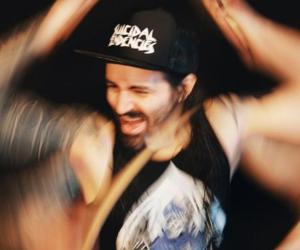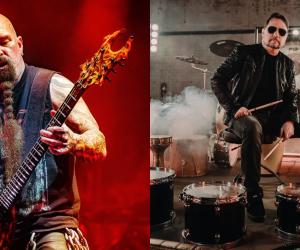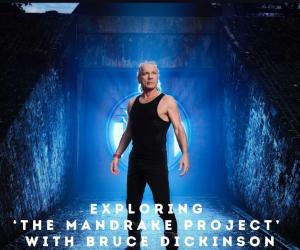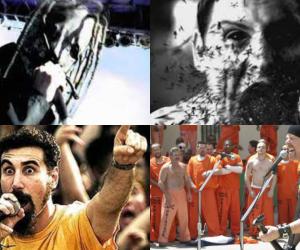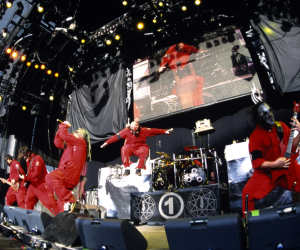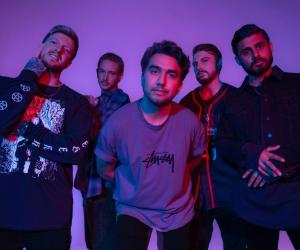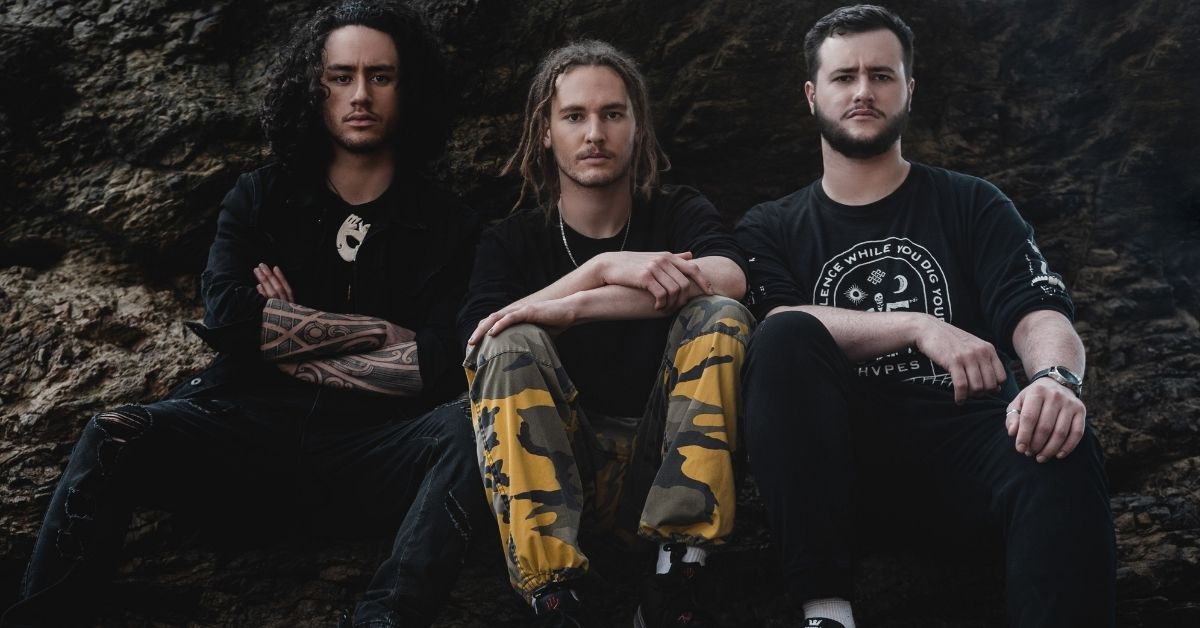
In the past few years, no emerging metal band has shaken up the international metal scene like Alien Weaponry. Since releasing their acclaimed Napalm Records debut Tū in 2018 the New Zealanders’ kinetic presence and unique sound – combining elements of thrash and groove metal with lyrics in the native indigenous language, Te Reo Māori — has attracted throngs of fans and media supporters across the globe. With tours under their belt with the likes of Slayer, Black Label Society and Gojira, the band who have been hailed as "the future of metal" by Metal Hammer, are poised to dominate the metal landscape for years to come.
In the lead up to the release of their second full length, the sonically ruthless and impassioned Tangaroa, brothers Henry de Jong (drums) and Lewis de Jong (guitars, vocals) spoke to Maniacs about all things Alien Weaponry, Tangaroa and taking Māori history to the metal masses, one song at a time.
Henry and Lewis of Alien Weaponry, how’s this crazy thing known as existence in 2021 treating you today?
Big question. I mean, obviously, we've had to deal with a few things in terms of COVID and everything, but as a band, we've been slowly adjusting to all of that getting used to how we run things, going in and out of lockdowns. It’s been an interesting year, for sure, an interesting couple of years, really. When it came to getting the album done, it did give us a bit more time to really focus on it, get all of our nitpicking done."
The album you’re talking about is of course your second full-length Tangaroa. How are you feeling about the album as a whole as it finally makes its way out into the world?
"We’re stoked with it. We feel like we've definitely progressed from the last album, while still keeping that Alien Weaponry flavour. We’ve mixed the recipe up slightly and added some new elements, some new flavours to the mix."
The world got an early taste of the album via the awesome video clip for Buried Underground which features Alien Weaponry fans from all over the world, performing a signature stomp. Did you find that an enjoyable method of interacting with your fans?
"Absolutely. It’s always cool to be able to be involved with something like that as a band. I know if it was me, and one of my favourite bands was asking for video clips, I'd definitely be stoked to be able to send it to them and see myself in the music video. I feel like in a way, it was us giving back to the fans a little bit and it ended up looking really cool, as well. I’m really glad about how that turned out. "
It was the perfect combination of concept and song and you’ve probably created some lifelong memories for people with it. It is also a bit of an example of necessity being the mother of invention, was that an ongoing theme of the recording process for this album, needing to be flexible and pivot?
"When we first got into the studio, we had one day in the studio and then the government announced we were going into lockdown. So we had basically set everything up, got everything exactly where we wanted it and recorded one drum track then we had to pack up our toys and go home for a month. That time did kind of allowed us to refine a few more things and tweak some stuff that we probably wouldn't have even thought about if that hadn't happened. So it was kind of a blessing in disguise in a way.
There have also been some challenges lately as we’ve just gone into level four lockdown over here, we are finding it harder to practice as Tūranga can't get over here, but we are still able to practice on our own, just like little things like that. I guess we’re being slowed down just a little bit by the world situation currently, but again, as I said before, it is something that we're adjusting to, and I think we're doing pretty well as a band."
You’re coping like established veterans, which is pretty impressive considering you’re still one of the younger bands, age-wise out there. Does it still surprise you a little that this is what you get to do for a living?
"It’s something that we’ve dreamed of since we started the band. It’s crazy to see how far it's come over the last few years, especially. I feel like we still haven't quite processed it yet. I think as we continue to do things and get to play bigger and bigger shows, it's still going to be something we’re constantly trying to process, as we work out where we are in the general scheme of things. I guess it's something that I don't really focus a lot on, as well. It’s not like we sit around thinking “Oh, yeah, we are a big band”, you know? We’re just focusing on the music side of things as far as where our energy is put”
One thing you have been able to do with Alien Weaponry is to introduce Māori history and folklore to a broader audience. That continues on Tangaroa, I'm wondering, is that something you take pride in the fact that you've managed to expose your culture to people who otherwise might not have had any familiarity with it?
"Absolutely. Even just within New Zealand, not enough people know about these stories or have a good enough grasp on New Zealand history and Māori history to know what we’re talking about initially. So it is something that's really cool, being able to share with people, you know, these stories that we learned growing up, and that we've found out about as we've gotten older. It's such a huge part of this country's history. And yet, even most New Zealanders don't know jack shit about any of that. So yeah, just having that ability to share these stories is something that I think is really powerful for us."
It feels particularly impactful when it is combined with the traditional Māori instrumentation that you’ve incorporated a lot more broadly on Tangaroa. Was that choice informed by the stories you were telling? And is it something that feels natural to you to do?
Ever since we started writing in Māori, we’ve included traditional instrumentation, but it’s definitely more prominent on this record."
"Something that I’ve just realized is that the Pūtātara, the big conch shell that I play on these records, I actually learned how to play that before I learned how to play the drums, so I guess it is the first instrument I ever learned how to play, so as far as incorporating it into our music goes, it is a bit of a no brainer. It is also such a big part of what we are talking about in our music and how we grew up, so it just feels appropriate for us to be doing it also."
Growing up, was there any metal bands in New Zealand that perhaps we might not be aware of that had done similar things?
No, not as far as we can tell. I mean, there are definitely bands who have been singing in Māori, but not metal bands. We were the first to really take that step, or at least get any form of recognition for it. I know Tiki Taane had a rock group, years ago, where he tried doing some Māori stuff and it never really clicked with the audiences. He thinks that just kind of wasn't really the right time like people weren't at the level where they could appreciate that yet. So yeah, I feel like we, we kind of got into it at the right time as well"
I also think what’s cool about the way that you do this with your music is that the stories are so perfectly matched with metal as a genre. For example, on the record, the song Tītokowaru is about a war chief who challenged the colonial government, now that story is epic metal territory!
"Yeah, absolutely. I mean, you know, since since ‘Kai Tangata’, that is one of the paths we've found that we can take. We can take these graphic and brutal stories from Māori history, and that’s something that matches so well, with what we do as a band. They've already got that aggression and that ability to make it into a haka kind of style and format, so it is very fitting. But then there's also so much room for songs like Īhenga where we're talking about the great travels of one of our ancestors, Īhenga who named a huge amount of places in New Zealand. And that's a very different aspect to the Māori songwriting that we do as well. So it's like this very flexible, kind of spectrum of songwriting that we get to do with the Māori history in New Zealand. "
Alien Weaponry have had a chance to tour with some pretty awesome bands through the early parts of your career, bands like Gojira, Slayer, Black Label Society, and appeared on a whole bunch of massive festivals. I'm wondering, at what point did you stop being overwhelmed by the presence of these people, you probably grew up idolizing?
I've never really been someone to fan out I kind of have more value in just talking to people rather than you know, wanting to get a photo or wanting to prove to everyone that I've met this person. I've kind of always tried to see people at face value. Because at the end of the day, everyone's just a person and they’re probably texting their girlfriend, seeing when the toilets going to get fixed, you know, just like any other person, you know?"
"I feel like it is a product of how Lewis and I were raised. A lot of people do get brought up watching a lot of TV and traditional media where people do get kind of idolized and like put up on this pedestal. We didn't really get brought up in that sort of stereotypical way. So like, yeah, our parents were very weird, so I guess that's, that's like a contributing factor to that as well"
I am curious what bands influenced you guys growing up? Was there any in particular that can be heard in the template for Alien Weaponry?
Rage Against the Machine inspired the gang vocal thing that we started off with. That was like a big thing for us when we started off is that all three of us would sing. So that kind of repeating of lines was a huge inspiration from Rage Against The Machine. We both also grew up listening to a heap of Metallica."
"Guitar wise, early on a big inspiration was Stevie Ray Vaughan and in latter times, Lamb of God, System of a Down, lately it has been stuff like Meshuggah, Polyphia."
That microtonal stuff that Polyphia do actually blows my mind! Does it blow yours too?
Yeah, they’re just on a different level, like I don’t think they’re even human It's kind of like Animals As Leaders as well, those guys on that same level where it's just like, it hurts my brain to listen to it, but I love it."
Now, those are all amazing bands, which actually leads pretty well into this set of rapid-fire questions that we like to ask every guest here, so if you’ll both humour me with some answers to these that would be great. First up, what is the first band that you remember loving as a kid?
Henry: "The first album that I ever discovered and loved was Ashes of the Wake by Lamb of God."
Lewis: "The first album I loved as a kid. I mean, I'm torn between Sacrament by Lamb of God and Dark Side of the Moon by Pink Floyd."
You might have the same answer to this. What was the first band you got to see live?
Henry: "The first band we both went to see was Lamb of God at Westfest. That was the band that we went to the festival to see, but I also remember seeing Animals As Leaders there on a tiny stage, before they blew up and it was the early afternoon and all three of me Lewis and Ethan were there watching and they just went ballistic."
Lewis: "We also saw Judas Priest live that night and Soundgarden"
What's one thing in your life outside of music that you're a bit of a maniac for?
Henry: "SciFi movies and djing, I've taken that up recently as well."
Lewis: "For me, it would be visual art, ethereal visual art."
The last one of these is pretty fun. If you could have a song start playing on cue every time you enter a room, to announce your arrival what song would you choose?
Henry: I just had like Duality by Slipknot come into my head but at the same time, that's a really fucking depressing song. So I'm not going to go with that. I could go with like the Devil In I, as far as a Slipknot song goes, you know? They're also one of my big inspirations"
Lewis: "Walk with Me In Hell by Lamb of God."
Tangaroa is out now via Napalm Records.
Listen to Tangaroa now.


